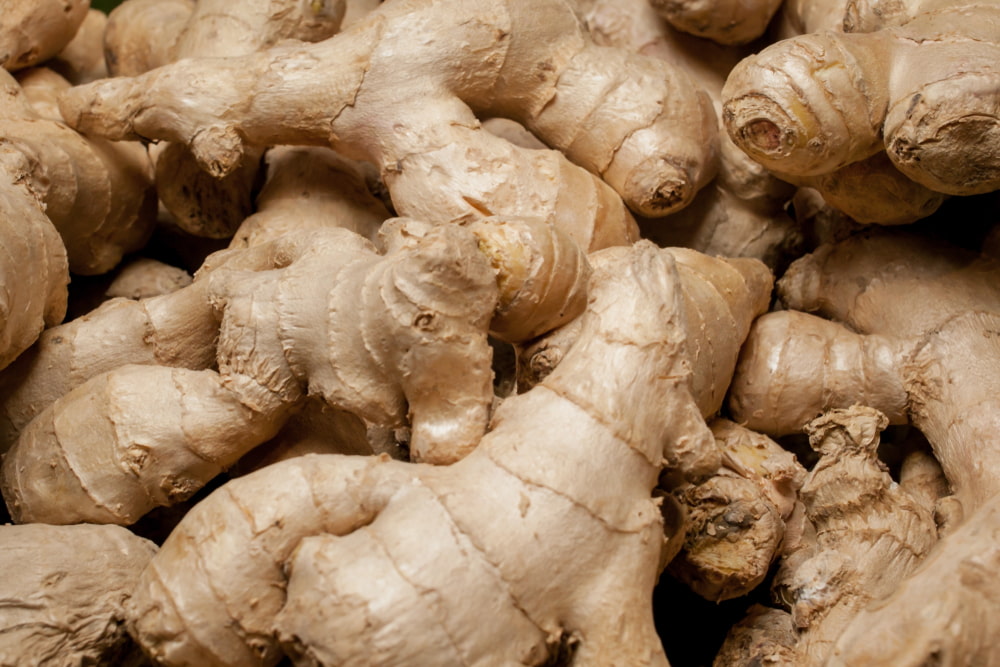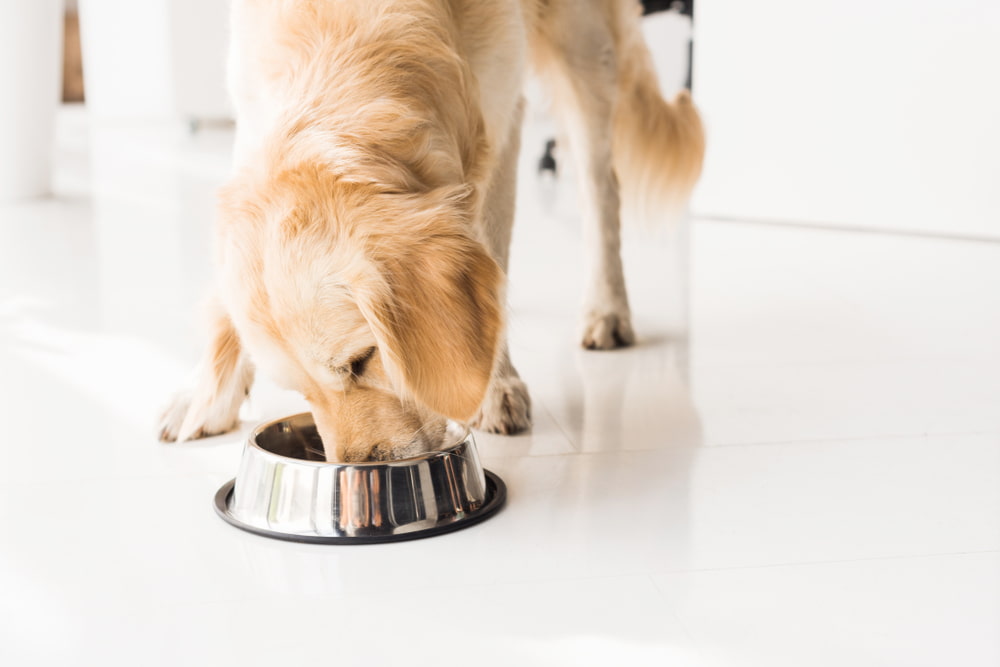How To Feed Ginger To Your Dog
Ginger comes in a variety of forms, including powder, capsule/pill, tincture, tea and raw root.
Fresh organic ginger root:
Cut the skin off with a knife and finely mince the yellow part of the root.
Demian Dressler DVM (Dog Cancer Vet), recommends the following dosages to help prevent nausea from cancer treatments …
10 lbs or less … ¼ tsp, 3 times daily 10 to 35 lbs … ½ tsp, 3 times daily 35 lbs or more … ¾ tsp, 3 times daily
Always start slow and work your way up to the full dose.
For other forms, Ottawa Valley Dog Whisperer recommends the following dosages:
Powdered ginger:
1 to 10 lbs … up to ⅛ tsp 10 to 20 lbs … ⅛ to ¼ tsp 20 to 50 lbs … 1 tsp 50 to 100 lbs … 2 tsp Over 100 lbs … up to 1 tbsp
Ginger tea:
You can buy ginger tea or make your own from fresh ginger root.
1 to 10 lbs … less than ¼ cup, 1 to 3 times daily 10 to 20 lbs … ¼ cup, 1 to 3 times daily 20 to 50 lbs … ¼ to ½ cup, 1 to 3 times daily 50 to 100 lbs … ½ to 1 cup, 1 to 3 times daily Over 100 lbs … up to 1 cup, 1 to 3 times daily
Capsule:
1 to 10 lbs … ½ capsule, 1 to 3 times daily 10 to 20 lbs … ½ to 1 capsule, 1 to 3 times daily 20 to 50 lbs … 1 to 2 capsules, 2 to 3 times daily 50 to 100 lbs … 1 to 2 capsules, 3 to 4 times daily Over 100 lbs … adult human dose
Tincture:
1 to 10 lbs … 1 to 3 drops, 2 to 3 times daily 10 to 20 lbs … 3 to 5 drops, 2 to 3 times daily 20 to 50 lbs … 5 to 10 drops, 2 to 3 times daily 50 to 100 lbs … 20 drops, 2 to 3 times daily Over 100 lbs … adult human dose
Ginger can thin the blood, so avoid it if your dog’s on blood thinning medication, or will be undergoing surgery or going into labor. It may also lower blood sugar and blood pressure. Talk to your vet if your dog has diabetes or has any kind of heart condition. Also consult with your vet if your dog is pregnant, on any medications or is being treated for a condition.
Ginger: A Brief Overview
“Ginger is a common tropical plant, and it is the root of this plant that is used as an herbal supplement in Western medicine,” says Dr. Lori M. Teller, clinical associate professor in the College of Veterinary Medicine and Biomedical Sciences at Texas A&M University. “The root is thick and knobby with a brown exterior and a pale light tan interior.”
According to the National Institutes of Health, ginger has been mentioned in ancient Sanskrit, Chinese, Greek, Roman, and Arabic texts for its health-related purposes. It has been used for thousands of years, particularly in Asian medicine, to treat stomach aches, diarrhea, and nausea.

Yes! Ginger and ginger root is safe for dogs, says Dr. Teller.
Dosing depends on the size of your pup.
“The dose for ginger is based on the size of your dog, and the range is 20-50mg/kg (about 10 to 25mg per pound of body weight),” says Dr. Tori Countner, veterinarian and owner of The Balanced Pet Vet.
Ginger comes in multiple forms ranging from fresh to powdered and thankfully they all have the same benefits.
Fresh ginger is a great option for dogs and can be given in sliced or grated forms.
A case where fresh ginger may work better than the dried herb is IBD flare up cases.
“In Chinese medicine, dried ginger can be a little too hot for their digestive tracts, so trying to sneak fresh ginger into their food is preferred,” adds Dr. Countner.
But she warns that some dogs may be put off by fresh ginger in their food. “Many dogs may not like the taste of fresh ginger, so the dried form or baked into a treat works well,” she says.
Any form of ginger is okay to give to your dog—including ginger root. Ultimately, it comes down to what your dog will eat.
“Find the form that is easiest for you to administer and that your dog is willing to accept,” says Dr. Teller.
If you give your dog ginger root, make sure to supervise your dog at all times to prevent them from swallowing a large piece.

Fortunately dogs can experience many of the same health benefits from ginger that humans can. These include:
“It can help with nausea from motion sickness and chemo-induced nausea,” says Dr. Countner. “A study showed that dogs receiving Cisplatin, a chemotherapeutic agent, had much less vomiting and nausea than dogs not taking ginger.”
“It is important to check with your veterinarian first and make sure the ginger will not interact with any of the chemotherapeutic agents your dog is receiving,” adds Dr. Teller.
Giving a dog ginger about 30 minutes before a car ride can have the same effects as giving Dramamine, according to one study.
“Ginger can help decrease gas and bloating, and also relax spasms in smooth muscle in the intestinal loops, which helps decrease pain with digestive issues, such as IBD (inflammatory bowel disease),” says Dr. Countner.
Ginger also may have anti-inflammatory benefits for dogs with hip and joint pain.
“There have been a few human studies that show anti-inflammatory effects of ginger, which can help relieve pain in 75 percent of osteoarthritis patients and rheumatoid arthritis symptoms,” says Dr. Countner.
“Ginger is an antioxidant, and may provide some cognitive support, so it can be given to dogs with cognitive dysfunction,” says Dr. Teller.
HOW MUCH GINGER CAN DOGS EAT?
Not a lot. If you’re feeding them powdered ginger, it is advised to feed them no more than ¼ of a teaspoon for tiny dogs likeChihuahuas, and no more than ¾ of a teaspoon for big breeds of dog. You should keep measurements of root ginger small too, but there’s no definitive guide on this. Paw-heps exercise a literal rule of thumb and give a piece no bigger than your thumb to a large dog.
Can Dogs Eat Ginger?
You dont have to choose between your pet and your wallet when it comes to expensive vet visits. Prepare ahead of time for unexpected vet bills by finding the pawfect pet insurance.
No pet owner likes to see their dog sick or in pain. For whatever reason, this feeling of empathy is ten-fold when the dog is older. Like elderly people (or any living being for that matter), aging dogs tend to have more ailments and health problems than younger dogs. Fortunately, there are many uses of ginger that can be used to help the aging dog.
There are many benefits that ginger brings to the table where older dogs are concerned. Ginger comes in several different forms to make dosing and supplementing simple: dry powders, teas, capsules or tablets, and tinctures (liquid form).
When dogs get older, their digestive system simply does not work as it used to when they were younger. Aging dogs can experience stomach problems for a number of reasons, many times without a true diagnosis. The smallest inconsistency can cause bloat, constipation, diarrhea, or even vomiting. Constipation is the most common stomach issue that older dogs deal with. Ginger is great for this because it promotes healthy movement of the bowels. This remedy also works with car or motion sickness in dogs. You can either add ginger to your dog’s diet daily or give them a dose when they are feeling down and out. For stomach ailments, you could also use the essential oil form of ginger. In this form, it is not to be ingested, but instead, place 1 to 2 drops on your dog’s paw or stomach when sickness occurs.
Ginger has anti-viral, anti-toxic, and anti-fungal properties. Older dogs have weaker immune systems, leaving them much more susceptible to bugs and viruses. Ginger can be used to strengthen a weakened immune system. This herb also promotes blood circulation, flushes out toxins, and also helps to level out low blood pressure, which are all common health conditions in older dogs. As an owner of an aging dog, you should also consider keeping your pet up to date on all of their vaccinations to ward off unwanted diseases.
If your elderly pooch suffers from arthritis, ginger can help your dog to move more freely. Arthritis can be a crippling disease, causing your pet to become immobile, which in turn causes a loss of muscle mass. Ginger is a natural anti-inflammatory, easing any inflammation of the joints your aging pet might experience. Unlike other pain relievers, ginger is a natural resource, so is is not hard on your dog’s stomach. Contrastingly, it is good for your dog’s stomach as mentioned above. A caution you should be aware of is, that because ginger is an anti-inflammatory, it can thin the blood and should not be used prior to surgery. Please be sure to consult your veterinarian right away if your dog sustains any cuts or bleeding while ginger is part of their diet.
Several studies have shown that ginger is a preventative for cancer in dogs. If your dog already has cancer, ginger can work as a dual purpose remedy because the anti-inflammatory agent helps the circulation, and ginger also boosts your dog’s immunity, both which are large factors in canine cancer.
Remember to consult your veterinarian any time that you start administering home remedies, especially if your dog does not react well to the treatment. Whether you believe in holistic treatment for your dog or not, ginger is a low cost, low-risk treatment for several ailments. Almost all medicinal substitutes for ginger have some type of side effect or risk associated with its use, while ginger is relatively safe, yet still effective for treating your older dog’s health issues.Youtube Play